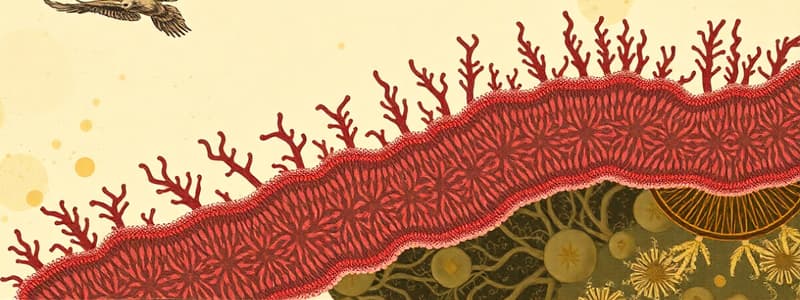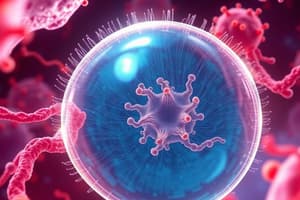Podcast
Questions and Answers
What type of proteins are produced in the endoplasmic reticulum (ER) that are primarily involved in hormone secretion?
What type of proteins are produced in the endoplasmic reticulum (ER) that are primarily involved in hormone secretion?
- Water-soluble proteins
- Neurotransmitters
- Lipid-based proteins
- Transmembrane proteins (correct)
Which function is NOT associated with the smooth endoplasmic reticulum?
Which function is NOT associated with the smooth endoplasmic reticulum?
- Steroid synthesis
- Lipid synthesis
- Detoxification
- Protein folding (correct)
What is the primary role of glucose-6-phosphatase found in the smooth ER regarding blood glucose levels?
What is the primary role of glucose-6-phosphatase found in the smooth ER regarding blood glucose levels?
- Convert glucose-6-phosphate to glucose (correct)
- Detoxify harmful substances
- Convert glucose to glycogen
- Facilitate lipid synthesis
What cellular response occurs due to chemical insult that requires increased detoxification?
What cellular response occurs due to chemical insult that requires increased detoxification?
Which of the following cells is most likely to have a well-developed smooth endoplasmic reticulum?
Which of the following cells is most likely to have a well-developed smooth endoplasmic reticulum?
What are the main products of the rough endoplasmic reticulum aside from proteins?
What are the main products of the rough endoplasmic reticulum aside from proteins?
Which process involves the conversion of non-carbon sources into glucose in the smooth ER?
Which process involves the conversion of non-carbon sources into glucose in the smooth ER?
Which of the following types of proteins typically enter the lumen of the endoplasmic reticulum?
Which of the following types of proteins typically enter the lumen of the endoplasmic reticulum?
What major component defines the rough endoplasmic reticulum?
What major component defines the rough endoplasmic reticulum?
What is one of the primary roles of smooth endoplasmic reticulum?
What is one of the primary roles of smooth endoplasmic reticulum?
Which of the following correctly describes the structure of the endoplasmic reticulum?
Which of the following correctly describes the structure of the endoplasmic reticulum?
Which of the following functions is NOT associated with the Golgi apparatus?
Which of the following functions is NOT associated with the Golgi apparatus?
What process partially reforms the nuclear envelope after cell division?
What process partially reforms the nuclear envelope after cell division?
What defines a specialized form of endoplasmic reticulum, such as sarcoplasmic reticulum?
What defines a specialized form of endoplasmic reticulum, such as sarcoplasmic reticulum?
Which of the following statements accurately describes the relationship between rough and smooth endoplasmic reticulum?
Which of the following statements accurately describes the relationship between rough and smooth endoplasmic reticulum?
What feature contributes to the granulation of rough endoplasmic reticulum?
What feature contributes to the granulation of rough endoplasmic reticulum?
What is one primary function of lysosomes?
What is one primary function of lysosomes?
Which component marks proteins for dispersion into lysosomes?
Which component marks proteins for dispersion into lysosomes?
What is the pH optimum for the enzymes found in lysosomes?
What is the pH optimum for the enzymes found in lysosomes?
What do primary lysosomes fuse with for digestion to occur?
What do primary lysosomes fuse with for digestion to occur?
What key role does the Golgi apparatus play concerning lysosomes?
What key role does the Golgi apparatus play concerning lysosomes?
Which of the following statements is true about peroxisomes?
Which of the following statements is true about peroxisomes?
What structural feature distinguishes a secondary lysosome?
What structural feature distinguishes a secondary lysosome?
How are hydrolytic enzymes synthesized before reaching lysosomes?
How are hydrolytic enzymes synthesized before reaching lysosomes?
What is the main role of peroxisomes in the cell?
What is the main role of peroxisomes in the cell?
What substance is produced as a by-product during the oxidation reactions in peroxisomes?
What substance is produced as a by-product during the oxidation reactions in peroxisomes?
Which enzyme is responsible for removing hydrogen peroxide in peroxisomes?
Which enzyme is responsible for removing hydrogen peroxide in peroxisomes?
In what condition is there typically severe abnormalities in infancy due to defects in peroxisomes?
In what condition is there typically severe abnormalities in infancy due to defects in peroxisomes?
How do secretory vesicles release their contents?
How do secretory vesicles release their contents?
Which cellular structure do all secretory vesicles arise from?
Which cellular structure do all secretory vesicles arise from?
What triggers the release of insulin from secretory granules in beta cells?
What triggers the release of insulin from secretory granules in beta cells?
Which type of enzyme in peroxisomes is responsible for the breakdown of fatty acids?
Which type of enzyme in peroxisomes is responsible for the breakdown of fatty acids?
What specialized function does the sarcoplasmic reticulum serve in muscle cells?
What specialized function does the sarcoplasmic reticulum serve in muscle cells?
Which statement about the smooth endoplasmic reticulum is NOT true?
Which statement about the smooth endoplasmic reticulum is NOT true?
Which of the following is a primary function of the Golgi apparatus?
Which of the following is a primary function of the Golgi apparatus?
What is the name of the face of the Golgi apparatus that is closest to the endoplasmic reticulum?
What is the name of the face of the Golgi apparatus that is closest to the endoplasmic reticulum?
What structure within the Golgi apparatus is associated with the transport of proteins?
What structure within the Golgi apparatus is associated with the transport of proteins?
In muscle contraction, what initiates the process?
In muscle contraction, what initiates the process?
How does the Golgi apparatus function in relation to its location within the cell?
How does the Golgi apparatus function in relation to its location within the cell?
Which statement best describes the relationship between the sarcoplasmic reticulum and smooth endoplasmic reticulum?
Which statement best describes the relationship between the sarcoplasmic reticulum and smooth endoplasmic reticulum?
What role does the Golgi apparatus play in relation to lysosomes?
What role does the Golgi apparatus play in relation to lysosomes?
What is a characteristic of the Golgi apparatus concerning its structure?
What is a characteristic of the Golgi apparatus concerning its structure?
Flashcards
Endoplasmic Reticulum (ER)
Endoplasmic Reticulum (ER)
A network of interconnected membranes within a cell, extending from the nuclear envelope to the plasma membrane. It plays a vital role in protein production, lipid synthesis, and detoxification.
Rough Endoplasmic Reticulum (RER)
Rough Endoplasmic Reticulum (RER)
The type of ER that has ribosomes attached to its surface, involved in protein synthesis and transport.
Smooth Endoplasmic Reticulum (SER)
Smooth Endoplasmic Reticulum (SER)
The type of ER that lacks ribosomes, responsible for lipid synthesis, detoxification, and other metabolic processes.
Golgi Apparatus
Golgi Apparatus
Signup and view all the flashcards
Secretory Proteins
Secretory Proteins
Signup and view all the flashcards
Lysosomes
Lysosomes
Signup and view all the flashcards
Peroxisomes
Peroxisomes
Signup and view all the flashcards
Sarcoplasmic Reticulum
Sarcoplasmic Reticulum
Signup and view all the flashcards
What are water-soluble proteins that exit the ER lumen?
What are water-soluble proteins that exit the ER lumen?
Signup and view all the flashcards
What are prospective transmembrane proteins?
What are prospective transmembrane proteins?
Signup and view all the flashcards
What is the endoplasmic reticulum (ER)?
What is the endoplasmic reticulum (ER)?
Signup and view all the flashcards
What is post-translational processing?
What is post-translational processing?
Signup and view all the flashcards
What is smooth ER?
What is smooth ER?
Signup and view all the flashcards
What is glycogenolysis?
What is glycogenolysis?
Signup and view all the flashcards
What is gluconeogenesis?
What is gluconeogenesis?
Signup and view all the flashcards
How is smooth ER involved in detoxification?
How is smooth ER involved in detoxification?
Signup and view all the flashcards
Excitation-Contraction Coupling (ECC)
Excitation-Contraction Coupling (ECC)
Signup and view all the flashcards
Smooth ER Detoxification
Smooth ER Detoxification
Signup and view all the flashcards
Golgi Apparatus Function
Golgi Apparatus Function
Signup and view all the flashcards
Cisternae
Cisternae
Signup and view all the flashcards
Cis Face
Cis Face
Signup and view all the flashcards
Trans Face
Trans Face
Signup and view all the flashcards
Golgi Vesicles
Golgi Vesicles
Signup and view all the flashcards
Golgi Apparatus: Cell Factory
Golgi Apparatus: Cell Factory
Signup and view all the flashcards
Golgi Apparatus: Cell's Post Office
Golgi Apparatus: Cell's Post Office
Signup and view all the flashcards
What does the Golgi apparatus process?
What does the Golgi apparatus process?
Signup and view all the flashcards
What is another function of the Golgi apparatus?
What is another function of the Golgi apparatus?
Signup and view all the flashcards
Where are primary lysosomes made?
Where are primary lysosomes made?
Signup and view all the flashcards
What else does the Golgi apparatus synthesize?
What else does the Golgi apparatus synthesize?
Signup and view all the flashcards
What is the main function of lysosomes?
What is the main function of lysosomes?
Signup and view all the flashcards
Where do lysosomes come from?
Where do lysosomes come from?
Signup and view all the flashcards
Describe the structure of peroxisomes.
Describe the structure of peroxisomes.
Signup and view all the flashcards
What are peroxisomes also known as?
What are peroxisomes also known as?
Signup and view all the flashcards
Catalase
Catalase
Signup and view all the flashcards
Zellweger syndrome
Zellweger syndrome
Signup and view all the flashcards
Secretory granules
Secretory granules
Signup and view all the flashcards
Exocytosis
Exocytosis
Signup and view all the flashcards
Insulin
Insulin
Signup and view all the flashcards
Glycogenesis
Glycogenesis
Signup and view all the flashcards
Glycogenolysis
Glycogenolysis
Signup and view all the flashcards
Study Notes
Cell Structure: Endoplasmic Reticulum (Smooth and Rough), Golgi
- Course: Fundamentals of Human Biology
- Code: FUNBIO.5
- Lecturer: Dr Irene Oglesby
- Date: October 3rd, 2024
Learning Outcomes
- Discuss the appearance of the endoplasmic reticulum (ER) in the cell.
- Discuss the role of smooth ER in cell activities, including lipid production and detoxification.
- Describe the structure of rough ER and its role in protein production.
- Describe examples of specialized ER, such as the sarcoplasmic reticulum.
- List the four major functions of the Golgi apparatus, including the production of primary lysosomes.
- Describe the structure and function of peroxisomes in the cell.
- Discuss the presence of secretory and zymogen granules in certain cell classes.
Endoplasmic Reticulum (ER)
- An elaborate membrane system that occupies up to 50% of the total membrane surface in animal cells.
- Called the ER from the Greek word "rete," meaning net.
- Extends from the nuclear envelope almost to the plasma membrane.
- Interconnecting channels or tubules that may form flattened discs called cisternae.
- Localizes the ER into specific cytoplasmic areas.
Two Types of ER
-
Rough ER:
- Abundantly present in cells engaged in protein synthesis.
- The "rough" appearance is due to attached ribosomes.
- Two types of proteins are synthesized:
- Water-soluble proteins that enter the ER lumen for release elsewhere.
- Transmembrane proteins that remain embedded in the membrane
- Synthesized proteins include digestive enzymes, hormones, plasma membrane proteins, neurotransmitters, and lysosomal enzymes.
- Post-translational processing (modifications) occurs, such as protein folding.
- Proteins are transported to Golgi apparatus.
- Could be involved in the impaired folding of proteins potentially with drastic consequences.
-
Smooth ER:
- Free of attached ribosomes.
- Primarily found in cells secreting lipids and steroids and in liver cells.
- Well-developed in cells that secrete steroid hormones, like those in the adrenal cortex, Leydig cells, and follicular cells.
- Functions:
- Lipid synthesis
- Steroid synthesis and secretion
- Carbohydrate metabolism
- Detoxification (including drug breakdown)
- Calcium (Ca²⁺) accumulation, especially in skeletal muscle cells (sarcoplasmic reticulum).
Smooth ER in Rat Liver Cells
- Chemical insult can cause increased detoxification activity and proliferation of the smooth ER.
Sarcoplasmic Reticulum
- A specialized form of smooth ER found in smooth and skeletal muscle cells.
- Stores and releases Ca²⁺.
- Plays a role in excitation-contraction coupling (ECC) during muscle contraction.
Golgi Apparatus
- Discovered in 1898 by Camillo Golgi.
- Found in all eukaryotic cells.
- Reaches its largest size and complexity in secretory and storage cells.
- In some animal cells, it is near the nucleus (the centrosome).
- In plant cells, Golgi bodies are dispersed throughout the cytoplasm.
- It consists of parallel arrays or stacks of curved cisternae/sacs, called cisternae.
- The number of cisternae varies from 3-7.
- Connected by tubules.
- Each cisternae is separated by a space called the lumen.
- Two distinct faces: cis face (receiving) and trans face (releasing).
Functions of Golgi Apparatus
- Processing: Modifies newly synthesized proteins and glycoproteins.
- Sorting: Sorts and packages proteins.
- Redistribution: Acts as a center for cell membrane redistribution.
- Production: Produces primary lysosomes.
- Synthesis: Involved in carbohydrate synthesis (e.g., polysaccharides and glycosaminoglycans - GAGs).
Golgi Apparatus - Structure
- The Golgi apparatus is usually located between the ER and the plasma membrane with the cis face closest to the ER. The trans face is at the plasma membrane.
- The cisternae are involved in sorting and packaging of substances.
- Associated vesicles are involved in transporting substances from one face to another or to other locations within the cell.
Golgi Apparatus - Function
- Acts as the "post office" of the cell, receiving proteins from the ER, modifying them, sorting them, and packaging them for transport to various destinations like lysosomes, plasma membrane, or for secretions.
Membrane-Bound Vesicles & Secretory Granules
-
Lysosomes:
- Found in animal cells.
- Contain powerful hydrolytic enzymes in an acidic environment for digestion.
- Originate from the Golgi Apparatus and are involved in intracellular digestion and removal of unwanted elements (like pathogens).
- Digestion occurs in lysosomes as indigestible material is accumulated as residual bodies, and lysosomes are involved in recycling or removal of old material involved in the cell pathway.
-
Peroxisomes:
- Round organelles in the cytoplasm, bound by a single membrane.
- Contain enzymes involved in oxidation reactions to produce hydrogen peroxide.
- Hydrogen peroxide is removed by the enzyme catalase.
- Involved in β-oxidation of fatty acids, previously thought to occur only in mitochondria.
- Zellweger syndrome is a defect in peroxisomal functions.
-
Secretory granules:
- Some cells specialize in rapidly secreting products, usually proteins.
- Cells concentrate and store these in secretory granules and vesicles.
- The number of granules varies.
- They are membrane-bound.
- Examples include insulin release from beta cells.
Studying That Suits You
Use AI to generate personalized quizzes and flashcards to suit your learning preferences.





